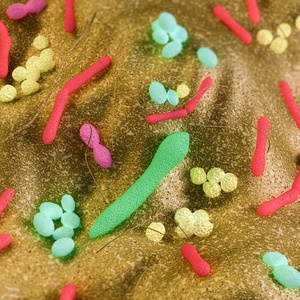
Certain bacteria dwelling in the human gut might feed depression, according to a new study that adds evidence to the theory.
Researchers found that among over 2 100 adults, those with depression showed differences in specific groups of gut bacteria. And people with higher concentrations of certain other gut bugs generally reported better mental well-being.
Some gut bacteria 'consistently depleted'
The research, published online in Nature Microbiology, is the latest to uncover links between human health and the gut microbiome. The term refers to the trillions of bacteria and other microorganisms that live in the intestines.
Those microbes are believed to do much more than aid in digestion. Research suggests they are involved in everything from immune system defences to producing vitamins, anti-inflammatory compounds and even chemicals that influence the brain.
But most research on such "gut-brain" communication has been done in animals, said Jeroen Raes, the senior researcher on the new study.
So his team looked for links between gut microbes and depression among over 2 100 adults taking part in two health studies. The investigators found that levels of two specific groups of gut bacteria – Coprococcus and Dialister – were "consistently depleted" in people with depression.
Meanwhile, people with higher levels of Coprococcus, and another group of bacteria called Faecalibacterium, typically gave better ratings to their quality of life.
Both types of bacteria break down dietary fibre to produce an anti-inflammatory compound called butyrate.
None of that proves those bacteria somehow contribute to – or protect from – depression, according to Raes, a professor at KU Leuven-University of Leuven, in Belgium.
But, he said, further studies should zero in on the bugs.
Gut and mental well-being
"After all the mouse studies," Raes said, "we now finally have robust human data that points to interesting target organisms that, in the future, may lead to drugs and novel probiotics."
Dr Emeran Mayer is a professor at the University of California, Los Angeles School of Medicine and author of the book The Mind-Gut Connection.
Mayer said the new findings add to evidence of an association between the gut and mental well-being.
But like Raes, he said they do not prove any particular microbes cause depression.
"It's the chicken-and-egg question," Mayer said. "People with depression certainly have different diets, and different habits, than people without depression. And that would affect the gut microbiome."
Mayer suspects there may be a "circular process", where depressed people can have changes in the composition of their gut microbes – and that, in turn, "reinforces" the depression symptoms.
Raes said further research is needed to see whether there is such a "vicious cycle". For now, he said, "We can't say that."
No quick fix
Studies in recent years, largely in animals, have been uncovering links between the composition of the gut microbiome and the risks of various health conditions – from other brain-related disorders, like dementia, to obesity, to autoimmune diseases such as type 1 diabetes and rheumatoid arthritis.
But the degree to which gut bacteria contribute to any human diseases remains unclear.
And even if the gut microbiome does influence depression symptoms, Mayer doubted that anything as simple as a probiotic supplement would offer a quick fix. Both the microbiome and depression are too complex.
However, he said, gut bacteria churn out metabolic byproducts – or "postbiotics". And research into those compounds should give insight into how the microbiome may benefit or feed human ills.
Mayer said he believes that any effective therapy aimed at the gut would have to affect its microbe balance "globally" – as opposed to simply adding a bacterial strain or two.
Diet changes can do that, he pointed out.
Diversity matters
In this study, there were hints that butyrate-producing bacteria were beneficial. And, Mayer said, those bacteria make butyrate when they break down various fibres from plant foods.
"I'd say eat a diet that's largely plant-based and highly variable in the types of plant foods," Mayer said. "If you're just eating tomatoes, that's not enough."
That's not just for the sake of producing butyrate, either. Based on what's known so far, Mayer said, it's the diversity of our gut bacteria that matters: The more diverse our microbes, the better.
And a diet low in processed foods and rich in plant foods – vegetables, fruits, legumes, nuts and grains – supports a more diverse gut microbiome, Mayer said.
Image credit: iStock




 Publications
Publications
 Partners
Partners











